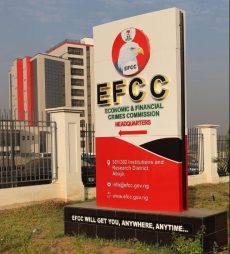Huthman and his company were arraigned before Justice Mojisola Dada in 2018 by the EFCC for allegedly providing false information to its official in a petition he (Huthman) wrote to the agencies alleging that a former Director of Lands, in Lagos State and Director of Saglons Beverages Venture Ltd, Alhaji Olabanji Oreagba allegedly forged the signature of former Vice President, Prof Yemi Osinbajo (then Attorney-General of Lagos State) on a Deed of Assignment to deprive him of his land.
In the petition, Huthman had urged the EFCC to investigate Oreagba whom he suspected had forged the signature of Prof Osinbajo on the Deed of Assignment in favour of Saglons Beverages Ventures Ltd.
Huthman also claimed in the petition that he did not sign the Form 1C which Oreagba allegedly used to process Governor’s consent for the Deed of Assignment for a 6.3 hectares land located within Complete Leisure Estate Ltd 103 hectares land in Sangotedo which Oreagba later sold to Property Mart Ltd.
Curiously, a few months after Huthman’s petition, the EFCC turned the case around and instead arrested the businessman claiming that he (Huthman) lied to its officer, Dan Azibagiri that the signature on the disputed Deed of Assignment was forged.
During the trial, the prosecution called seven witnesses, Oreagba; Azibarigi; Dr. Muiz Banire, SAN; an EFCC detective, Emeka Okonjo; Mr. Babatunde Fashanu, SAN; a forensic document examiner, Benedict Agweye and the Managing Director of Property Mart Real Estate Investment, Ayodeji Fasunwon while the defence team led by former Solicitor-General of Lagos State, Mr. Lawal Pedro, SAN, called three witnesses, Huthman, a Director of Land Services in Lagos State Land Bureau, Bamidele Ibrahim and….
Delivering judgment in the matter, in 2019, one year after the arraignment, Justice Dada upheld the submission of the defence team that there were indeed discrepancies in the signature appended on the Deed of Assignment which Oreagba allegedly used to secure Governor’s Consent for 6.3 hectares of land which formed part of the 103 hectares of land belonging to Huthman.
Wondering how the EFCC came about the charges against Huthman and his company, the judge said: “Although, it will appear that the Prosecution in the charge against the Defendants seemed to have shield away from basing this case on the petition in Exhibit P4, as the particulars of the charge made no reference to it but rather relied on the allegedly false information of the Defendants to its officer, Dan Azibagiri between June 22, 2016, and February 15, 2017. Interestingly, the evidence of the said Public officer, Azibagiri as PW2, anchored his evidence solely on Exhibit P4, the Petition.
“This petition is dated June 14, 2016, and was received by the Commission on June 16, 2016. Azibagiri in his evidence stated that it was minuted to his team for discreet investigation on June 27, 2016. So where did the false information to PW2 arise from June 22, 2016, when he could not have seen the Petition before June 27, 2016? “
On whether the signature on the Deed of Assignment was forged as alleged by the EFCC, Justice Dada held: “The Deed of Assignment in exhibit P4 has been established by both parties before the court as having been signed by the Attorney General of Lagos State as endorsed on it for the Governor of Lagos State but by Dr. Muiz Banire, SAN, who was then the Commissioner for the Environment without stating his designation as such, neither was he ever Attorney-General of Lagos State.
“…By tendering exhibit P11, the Prosecution is surmising that the Defendants should have known that the signature in the two documents was the same. This is a fallacy as it is not the duty of the Defendants to make such a ludicrous assumption and so the need for his Petition in Exhibit P4 wherein he stated inter alia thus, “…forgery of the signature of his excellency Prof. Yemi Osinbajo SAN… as the Attorney-General of Lagos State on a Deed of Assignment in favour of Saglons Beverages Ventures Ltd by its Managing Director Alhaji Olabanji Oreagha “for a thorough investigation and if culpable for Prosecution of Financial crime”. The operative words are, “for thorough investigation and IF culpable for prosecution.” How then can this be termed false information? This is aside the many frailties the disputed Deed of Assignment.”
The judge also condemned what it described as suppression of fact by the EFCC in the matter and noted that the agency in its quest to make the ‘hunter, the hunted’, brought evidence that supported its mission, but suppressed facts in its possession that pointed out that there were indeed discrepancies in the contentious Deed of Assignment.
She said: “The disputed Deed of Assignment attached to Exhibit P4 tells serious lies about itself and is therefore suspect and was rightfully referred to the EFCC for investigation. The said investigation however ran aground and turned round to hunt the hunter; the defendants.
“It is frightening that while the prosecution was able to tender a reply of the Registrar of Titles signed by Ms. A.M Alli-Balogun dated December 23, 2016, in response to and attached to their letter dated December 15, 2016; exhibit P16 which said response seems to support the allegation against the defendants, the prosecution could not tender or acknowledge either the reply of the Directorate of Lands Services to their letter dated July 13, 2016 or the said letter. This is proof of suppression of fact and withholding evidence envisaged under section 169(d) 0f the Evidence Act, 2011.
“It smacks of malice and obvious compromise on the part of the Prosecution, the very thing the Commission is set up to fight and which huge public funds are being expended. ….Just like DW3, Bamidele Ibraheem in exhibit D15 suggested that the EFCC should beam searchlight on the evidence of the transaction among parties, this court urges the Commission to beam its searchlight on the investigation of this case and in particular its letter to the Directorate of Lands Services and the reply thereto and why same were withheld from the court.
In conclusion, therefore, I hold that the information given by the defendants to the Public officer is not proved beyond reasonable doubt as required by law. ….Consequently, the case fails in its entirety against the defendants in the light of the facts and circumstances of this case.”






